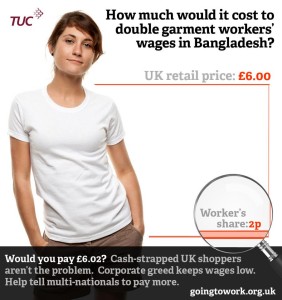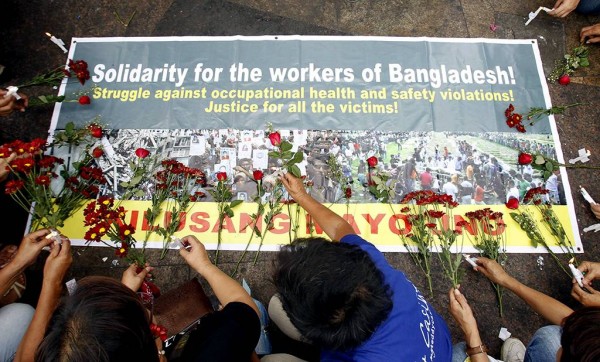 A week a half back Aaron Gilmore took his own political life. He was driven to do so by the treachery of a (former) friend, the Prime Minister`s guidance and a baying pack of journalists.
A week a half back Aaron Gilmore took his own political life. He was driven to do so by the treachery of a (former) friend, the Prime Minister`s guidance and a baying pack of journalists.
Saturation media coverage obscured another tragic news story; the Rana plaza collapse in Dhakar, Bangladesh had claimed its thousandth victim. Earlier, it seemed that the body count would settle at four to five hundred. However, in a BBC news report (10th May) Brigadier General Siddiqul Alam, who was overseeing the recovery operation, announced that `we have found a huge number of bodies in the stairwell and under the staircases. When the building started to collapse workers thought they would be safe under the staircases”.
When the story broke, news agency photos and footage gave the impression of a natural disaster. The victims appeared just as dead as those claimed by a flood or an earthquake. Subsequent coverage in the mainstream media and on the web pointed to an atrocity rather than a disaster.
From this angle, a villain was quickly identified; factory owner Mohamed Sohel Rana. He had previously declared the eight story complex safe, evident cracks in the walls were nothing to worry about. As Mohamed`s criminally negligent behaviour and corrupt political dealings were publicised, Dhakar locals called for the death penalty.
This simple and convenient `third world` storyline has since been subsumed by amore disturbing picture. It goes by the title of Death, Shopping and Global Capitalism.
This is how it looks.
The Bangladeshi political establishment, to which Mohamed belongs, oversees a multi-billion dollar garment industry. At 17% of GDP and 80% percent of export earnings it is the country`s lifeblood. The 3.2 million workers, primarily young women from surrounding rural regions, are trapped in an economic vice. On one side major overseas brands and retailers demand large margins and a flexible,`just-in-time` supply chain. From the other side wages and conditions are determined by a global labour hierarchy which positions Bangla- Deshi workers at the bottom. On average they earn substantially less than garment workers in China and Vietnam. Locally, this vice is maintained through a brutal and deceptive subcontracting system. A major retailer will place an order with a `first tier` factory with appropriate health and safety regulations. But if margins can`t be met on the original order another subcontractor is searched for. They will supply a workforce to work longer shifts for lower wages in more dangerous conditions. The order is turned around and sent back to the first factory for checking and distribution.
In the` second tier` factories potentially life threatening work environments are the norm. In 2005 a similar factory building collapsed in the same Dhakar suburb. Sixty four workers died. In Ashulia, Dhakar in November last year 112 workers died in a factory fire. At the Rana plaza site the Bangla Deshi Centre for Worker Solidarity has recovered order documents showing that garments were manufactured for a tenth of their retail price.
Major brands/retailers who have received garments from the complex include Walmart, Primark, Joe Fresh, Benetton, Loblaw,Bonmarhe, JC Penney and the Children`s Place. Rana Plaza produced clothing has been sold in Britain, Denmark ,France, Canada, Germany, Spain, Ireland, Canada and the United States. The big names have given condolences and support to the victim`s families. Some, however, are desparate to avoid regulations. A recent Bangla Deshi Accord on Fire and Building Safety which legally requires companies to undertake independent inspections of their supplier factories and pay for necessary safety improvements, has not been universally supported. As of May 15 only two US retailers had signed on; PVH (the parent company of Tommy Hilfiger and Calvin Klein) and Abercrombie and Fitch. Notably, GAP insisted on a guarantee against lawsuits and Walmart came up with its own, self regulatory proposal.
For New Zealand shoppers the Rana plaza atrocity should be a wake up call. After the demise of our own clothing factories and the working class cultures which surrounded them, cheap imports abound. Blouses from Posties and other cut price retailers are not produced by unionised workforces. And, at least some of your Apple Iphones are supplied by Foxconn factories in China. Their contribution to worker welfare includes the installation of suicide nets to reduce fatalities. Should I also mention Nike and Reebok shoes, toys from the warehouse, soccer balls from India….. ? Or should we instead obsess ourselves with the poor public behaviour of our politicians?






Globalisation is obviously a scam – the key issues being environmental, labour and (tragically in this case) safety arbitrage, which almost no one wants to talk about. The only reason they make everything so cheaply in 3rd world countries is because they don’t value the items above in the same regard we do. It’s simply cheating, and if we GENUINELY value these things HERE, we should demand they adopt the same rules THERE. If not, then we should either lower ourselves to their level (strange, no one seems to want that option) or put appropriate import tariffs on their goods which instantly levels the playing field.
Further, given the way these “free trade” globalisation measures are implemented it often seems it doesn’t actually bring a real increase in TOTAL trade for the countries that adopt it:
http://www.youtube.com/watch?v=PSRJZi4XmIs (see 3:30 in, but the whole thing is worth watching).
The population explosion in Bangladesh (40% increase in 20 years) hasn’t helped. I’m not blaming anyone – just saying.
Buying locally made, quality product, at a fair price isn’t just helping fellow New Zealanders – it’s a political act.
Awesome. Let’s help the poor of Bangladesh by refusing to trade with them. That’ll work.
Oh for god’s sake. The main argument here is for improving safety at the factories. Nobody should have to work in such conditions. This is achievable and it seems that the big-name companies who sell the products these people produce are in principle willing to force the issue, as well they should.
Worrying overmuch about low wages there is a bit pointless. I get paid a lot less than someone in Japan, but then again I don’t have to pay $10 for an apple at the supermarket. If we start getting too uppity about this, then Bangladesh won’t be able to trade. Yes, it sucks when you have to make clothing for a pittance, but it sucks even more when your country can’t get the stuff it needs to trade the clothes for.
If you really wanted to end this sort of exploitation, you would advocate for completely free movement of labour. That would quickly put the cat among the pigeons.
The coming 20 metre rise in sea level that corresponds to the current 400ppm CO2 will help solve the problem of exploitation:
1. Most of Bangladesh won’t exist because it will be inundated.
2. The homes and commercial premises of the elites in New York and London who set up globalisation will be under water.
That is on track for around 2035.
Of course, before that happens the banksters’ globalised Ponzi scheme will unravel.
That is on track to collapse around 2015.
Stock up while ya can because ‘stuff’ will start to get expensive, just before it ceases to exists, in the shops that is.
Fill up your attic with brand new shoes
a pair a week until the oil-crash news
pick sizes and styles that will sell and last
because when there’s no cars shoes wear out fast
Don’t tell a soul (I intend no pun)
you can’t defend against a grim mans gun
pack some for you – you’ll need some too
and maybe some tacks and maybe some glue
and all the things that strugglers need
some axes and shovels and long-life seeds
and fishing tackle and guns and bows
and books on things that nobody knows
and needles and thread and lots of wool
and keep it up ’til your attic is full
tell no-one at all not even your kin
just store it and wait for the fun to begin
and maybe those shoes will be worth more than gold
and worth more than diamonds whenever they’re sold
and with care and with skill your attic will be
a bank for your future, just try it and see
Comments are closed.